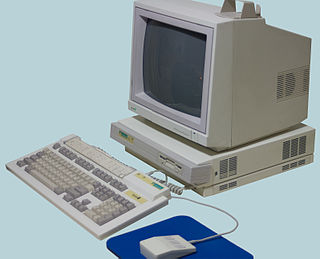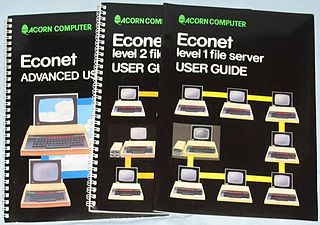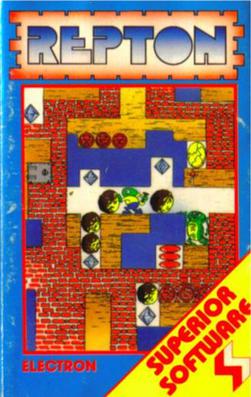Related Research Articles
BBC BASIC is an interpreted version of the BASIC programming language. It was developed by Acorn Computers Ltd when they were selected by the BBC to supply the computer for their BBC Literacy Project in 1981.

Acorn Computers Ltd. was a British computer company established in Cambridge, England in 1978 by Hermann Hauser, Chris Curry and Andy Hopper. The company produced a number of computers during the 1980s with associated software that were highly popular in the domestic market, and they have been historically influential in the development of computer technology like processors.

The Acorn Archimedes is a family of personal computers designed by Acorn Computers of Cambridge, England. The systems in this family use Acorn's own ARM architecture processors and initially ran the Arthur operating system, with later models introducing RISC OS and, in a separate workstation range, RISC iX. The first Archimedes models were introduced in 1987, and systems in the Archimedes family were sold until the mid-1990s alongside Acorn's newer Risc PC and A7000 models.

RISC OS is a computer operating system originally designed by Acorn Computers Ltd in Cambridge, England. First released in 1987, it was designed to run on the ARM chipset, which Acorn had designed concurrently for use in its new line of Archimedes personal computers. RISC OS takes its name from the reduced instruction set computer (RISC) architecture it supports.
Acornsoft was the software arm of Acorn Computers, and a major publisher of software for the BBC Micro and Acorn Electron. As well as games, it also produced a large number of educational titles, extra computer languages and business and utility packages – these included word processor VIEW and the spreadsheet ViewSheet supplied on ROM and cartridge for the BBC Micro/Acorn Electron and included as standard in the BBC Master and Acorn Business Computer.

RISC iX is a discontinued Unix operating system designed to run on a series of workstations based on the Acorn Archimedes microcomputer. Heavily based on 4.3BSD, it was initially completed in 1988, a year after Arthur but before RISC OS. It was introduced in the ARM2-based R140 workstation in 1989, followed up by the ARM3-based R200-series workstations in 1990.

Econet was Acorn Computers's low-cost local area network system, based on a CSMA-CD serial protocol carried over a five-wire data bus, intended for use by schools and small businesses. It was widely used in those areas, and was supported by a large number of different computer and server systems produced both by Acorn and by other companies.

Repton is a video game originally developed by 16-year-old Briton Tim Tyler for the BBC Micro and Acorn Electron and released by Superior Software in 1985. The game spawned a series of follow up games which were released throughout the 1980s. The series sold around 125,000 copies between 1985 and 1990 with Repton 2 selling 35,000 itself. The games have since been remade for several modern systems, including iRepton for the iPhone / iPod Touch in 2010, and Android Repton 1, Android Repton 2 and Android Repton 3 from 2016 to 2018.
Timeworks Publisher was a desktop publishing (DTP) program produced by GST Software in the United Kingdom and published by Timeworks, Inc., in the United States.

Superior Software Ltd is a video game publisher. It was one of the main publishers for the BBC Micro and Acorn Electron computers in the 1980s and early 1990s, and occasionally published software to the Commodore 64, Amiga, ZX Spectrum and Amstrad CPC. It currently releases games for Microsoft Windows, iOS and Android, mostly updates of its original games.
Xara is an international software company founded in 1981, with an HQ in Berlin and development office in Hemel Hempstead, UK. It has developed software for a variety of computer platforms, in chronological order: the Acorn Atom, BBC Micro, Z88, Atari ST, Acorn Archimedes, Microsoft Windows, Linux, and more recently web browser-based services.
The Acorn Business Computer (ABC) was a series of microcomputers announced at the end of 1983 by the British company Acorn Computers. The series of eight computers was aimed at the business, research and further education markets. Demonstrated at the Personal Computer World Show in September 1984, having been under development for "about a year" and having been undergoing field trials from May 1984, the range "understandably attracted a great deal of attention" and was favourably received by some commentators. The official launch of the range was scheduled for January 1985.
The Fourth Dimension (4D) was a major video game publisher for the BBC Micro, Acorn Electron, Acorn Archimedes and RiscPC between 1989 and 1998. Previously, The Fourth Dimension had been known as Impact Software, which specialised mainly in BBC Micro games. Some of 4D's staff had worked for Superior Software. Notable release included Cyber Chess, Stunt Racer 2000, Galactic Dan and Chocks Away.

Stryker's Run is a video game designed by Chris Roberts and Philip Meller for the BBC Micro and BBC Master which was published by Superior Software in 1986. It was also later converted to the Acorn Electron. It is a 2D side-scrolling action game. It was well received, particularly for its graphics.
Designer Castles was a software title for the BBC Micro and later Acorn Archimedes range of computers.

Acorn User magazine was founded by Acorn Computers in 1982, contract-published by Addison-Wesley, to coincide with the launch of the BBC Micro. It covered the range of Acorn home computers, the BBC Micro and Atom at first and later the Electron, Archimedes and Risc PC.

The Micro User was a British specialist magazine catering to users of the BBC Microcomputer series, Acorn Electron, Acorn Archimedes and, to a limited extent, the Cambridge Z88. It had a comprehensive mix of reviews of games, application software, and the latest Acorn computers; type-in programs, a correspondence page offering help with computer problems, and approachable technical articles on programming and the BBC Micro's internals.

The BBC Microcomputer System, or BBC Micro, is a series of microcomputers designed and built by Acorn Computers Limited in the 1980s for the Computer Literacy Project of the BBC. The machine was the focus of a number of educational BBC TV programmes on computer literacy, starting with The Computer Programme in 1982, followed by Making the Most of the Micro, Computers in Control in 1983, and finally Micro Live in 1985.

Deathstar is multidirectional shooter for the Acorn Electron and BBC Micro developed by Peter Johnson and originally published in the UK by Superior Software in 1985. It is a clone of the arcade game Sinistar.
RISC OS, the computer operating system developed by Acorn Computers for their ARM-based Acorn Archimedes range, was originally released in 1987 as Arthur 0.20, and soon followed by Arthur 0.30, and Arthur 1.20. The next version, Arthur 2, became RISC OS 2 and was completed and made available in April 1989. RISC OS 3 was released with the very earliest version of the A5000 in 1991 and contained a series of new features. By 1996 RISC OS had been shipped on over 500,000 systems.
References
- 1 2 Gordon J. Key
- 1 2 3 Davidson, Pete (November 1988). "Key to success". The Micro User .
- ↑ "Starfighter 3000". Archived from the original on 2012-04-13. Retrieved 2012-04-29.
- ↑ Retro Inspection: Acorn Electron
- ↑ Wade, Stephen (August 1990). "Software Scene–E-Type". The Micro User .
Less than a year after the original release for the Archimedes series comes the 8-bit version of Gordon Keys'[ sic ] excellent E-Type racing game [...]
- ↑ Lazarus (December 1989). "Software Scene–E-Type ...in the fast lane". The Micro User .
The author of this excellent product is Gordon Key [...]
- ↑ McLachlan, David (June 1989). "Software Scene–Holed Out ... a fairway to spend your time". The Micro User .
[...] with what is the best golf simulation I've seen on any Acorn machine.
- ↑ Lazarus (August 1989). "Software Scene–Holed Out ... mnuch faster, better". The Micro User .
[...] it is quite a stunning piece of work, ranking with Zarch and Conqueror in quality.
- ↑ Turnbull, Steve (July 1990). "Software Scene–Apocalypse!". The Micro User .
Gordon Key ranks as one of the best games programmers for Acorn machines [...] stunning speed of the vector graphic 3D shoot-'em-up Apocalypse.
- ↑ Lazarus (January 1991). "Software Scene–Powerband". The Micro User .
Gordon Key, author of the best type-in games from The Micro User and now the greatest Archimedes games, has done it yet again with Powerband.
- ↑ "What's Old?". Archived from the original on 2009-01-11. Retrieved 2012-04-29.